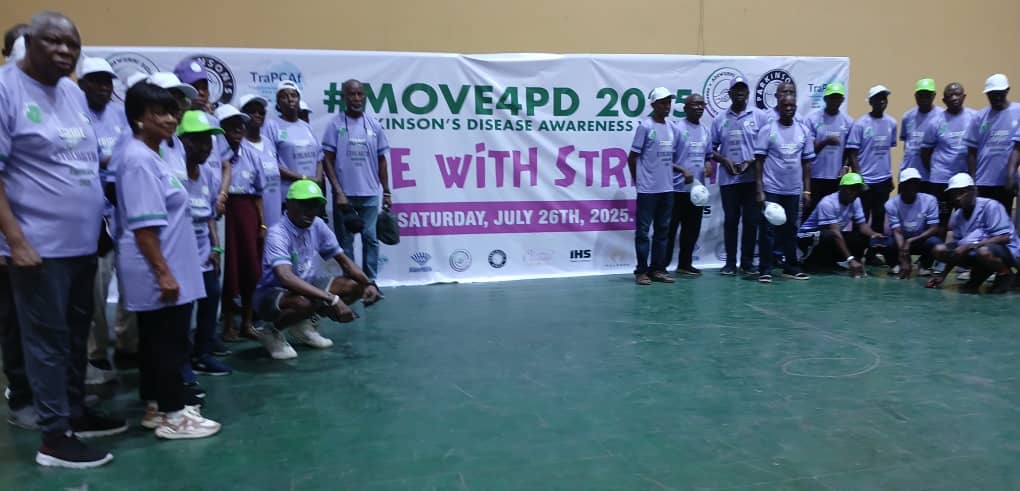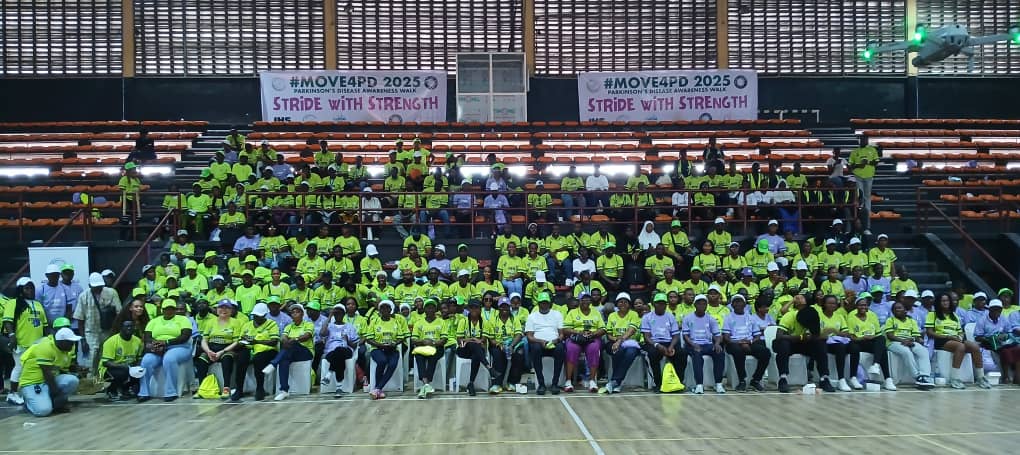
Peple living with Parkinson’s disease (PwPs) at the ADPF forth awareness walk on Saturday 26th July, 2026
When renowned Nigerian engineer and mathematician, Dr. Adewunmi Desalu was diagnosed with Parkinson’s disease, his family was thrown into uncharted territory. For 11 years, his wife, Mrs. Omorin Desalu, walked that path with him, stumbling through ignorance, battling isolation, and eventually transforming pain into purpose.
Today, through the Adewunmi Desalu Parkinson’s Foundation (ADPF), she’s making sure others no longer suffer in silence.
Parkinson’s disease is a progressive neurological disorder caused by the loss of dopamine-producing brain cells. “It doesn’t kill you immediately,” Mrs. Desalu says, “but if untreated, it strips life of its quality.”
She spoke on the sidelines of the fourth edition of the foundation’s Parkinson’s Disease Awareness Walk, themed ‘Stride with Strength’, a 2-kilometre walk aimed at raising awareness and fostering community support for people living with Parkinson’s.
She noted that Parkinson disease is the second-fastest-growing neurodegenerative disease globally, next to Alzheimer’s.
Early signs include shuffling gait, bent posture, lack of facial expression, and difficulty speaking.
Living Without Information
“There was nowhere in Nigeria we could turn to for Parkinson’s information,” she said. “We didn’t even go to neurologists because they’re mostly in federal and state hospitals.”
In contrast, in the U.S., they were handed pamphlets, given advice on diet, sleep, mental health, and support for caregivers. This disparity birthed ADPF.
The Mission of ADPF: Hope with Every Step
“We didn’t want families in Nigeria to step on the same landmines we did,” Desalu shared.
As part of its commitment to improving the lives of people living with Parkinson’s disease (PwPs), ADPF runs a series of revolving, patient-centered programs aimed at addressing both the medical and emotional needs of patients and caregivers.
One of its flagship services is the Medication Assistance Programme, which ensures access to essential Parkinson’s drugs at no cost. “For many patients, the cost of medication can exceed the minimum wage,” says Mrs. Omorin Desalu. “This initiative helps to bridge that gap for families struggling to cope.”
The foundation also offers social support groups, creating a safe and welcoming space where patients, caregivers, and family members can connect, ask questions, share coping strategies, and draw emotional strength from one another. These support networks play a crucial role in reducing isolation and fostering a sense of community.
To combat micrographia, a condition where handwriting becomes abnormally small and illegible due to Parkinson’s, handwriting classes are provided to help patients maintain their ability to write clearly and confidently.
Speech therapy is also available to help individuals retain or improve their ability to communicate effectively, as Parkinson’s can significantly impact speech and voice control.
Recognizing the therapeutic benefits of movement, the foundation incorporates dance therapy, which has been shown to improve gait, balance, and overall motor function. This is complemented by Rock Steady Boxing, a non-contact fitness regimen designed to boost coordination, agility, and endurance among patients.
To support early diagnosis and intervention, ADPF provides hospital referrals for neurologist assessment, ensuring that those with symptoms are evaluated by specialists to confirm or rule out Parkinson’s disease. This is often the first step in helping individuals access the right treatment.
Each patient is also given a physiotherapy assessment to evaluate how Parkinson’s is affecting their mobility, functionality, and safety. From there, tailored physiotherapy sessions are designed to help patients maintain or improve physical function, reduce the risk of falls, and preserve independence and quality of life.
Finally, ADPF remains steadfast in its awareness and advocacy efforts, regularly organizing sensitization outreaches, training sessions, and public education campaigns. These initiatives aim to erase the stigma around Parkinson’s, enlighten the public, and influence health policy in favor of those affected by the disease.
Together, these interventions form a holistic support system, one that not only addresses the clinical aspects of Parkinson’s but also restores hope and dignity to those who live with it.
“We want patients to live as normally as possible. If you lock them indoors, they will wither. Social isolation causes depression.”
- Why Movement Matters
Parkinson’s patients lose dopamine. Exercise stimulates its production.
“Even slow walks help,” she explained. “You saw our patients boxing, dancing, playing table tennis. They smiled. They felt alive.”
The foundation’s programs aren’t just physical therapy, they’re about restoring dignity, self-worth, and purpose.
Medication and the Cost of Living
“Parkinson’s medication can cost over ₦70,000 monthly,” she said. “That’s Nigeria’s minimum wage.”
Many Nigerians simply can’t afford treatment. ADPF steps in to bridge the gap by providing drugs to patients at no cost.
The Problem of Visibility
“At the World Parkinson’s Congress in Barcelona, Spain people were surprised we had Parkinson’s in Nigeria. Why? Because we’re not at the table.”
Even diagnosis tools and medication dosages are tailored for white populations. African Parkinson’s stories are barely documented.
Desalu advocates for localized research, pointing out how black patients may “pass” certain tests that white patients fail, even while living with Parkinson’s.

A cross section of participants
Faith vs. Medicine: A Call for Change
“It’s not the church or mosque you run to first. Go see a doctor,” Desalu warned. “Pray in your room, but seek help medically.”
She urged Nigerians to stop hiding sick relatives and to ‘mind their neighbor’s business’ when they notice symptoms.
Building Awareness, One Walk at a Time
The ADPF organizes annual walks. Attendance has grown from 150 participants in the first year to over 800 in 2025.
“We’ll keep walking, keep talking, and keep fighting. Even if only 10 people show up, we won’t stop.”
The Government’s Role: Support, Not Sole Responsibility
“This is not a rich man’s disease. When it rains, it rains on every roof,” Desalu said, responding to the myth that Parkinson’s only affects the wealthy.
She emphasized that citizen power is just as important as government support, calling for:
More affordable medication
Inclusion of Parkinson’s in public health policy
Facilities and training for neurological care
Despite no accurate national statistics on Parkinson’s in Nigeria, one thing is clear, many suffer in silence. But with every step taken by ADPF, with every story told, and with every person helped, a once invisible condition is now gaining the visibility, and dignity, it deserves.
“We may not know how many people have it,” Desalu said, “but we know they’re out there. And we’ll keep walking for them.”